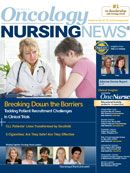Calling a Chemo Nurse: Pager Program Promotes Safe Chemotherapy Practice
In fall of 2009, Smilow Cancer Hospital at Yale-New Haven opened a new, state-of-theart, 15-story, clinical facility with the latest advances in diagnostic, therapeutic, and surveillance procedures.
Monica Fradkin, RN, BSN, MPH, OCN,
Kelli-Ann Choun, RN, BSN, OCN
Kirsten Pedersen, RN, BSN, OCN
Sarah Tonucci, RN, MSN, OCN
In fall of 2009, Smilow Cancer Hospital at Yale-New Haven opened a new, state-of-theart, 15-story, clinical facility with the latest advances in diagnostic, therapeutic, and surveillance procedures. This facility includes all services (inpatient and outpatient) and specialties (surgery, radiation, medical oncology, and support services) in one healthcare facility.
There are times when oncology patients are scheduled to be admitted to Smilow Cancer Hospital for chemotherapy administration, and they overflow to other units or are transferred to critical care areas within the Yale- New Haven Hospital because of a full census. With this in mind, as well as the increasing use of antineoplastic agents in the non-oncology setting, we thought it imperative that a program be developed to address the safe administration of chemotherapy throughout the healthcare system.
Patients with autoimmune diseases and other non-oncology conditions are not typically admitted to oncology units and consequently are often cared for by nurses who have infrequent exposure to—and do not receive specific training for—chemotherapy or biotherapy administration. Through quality improvement reviews, we identified medication errors with oral chemotherapy in nononcology patient populations; increasingly, we also received requests for chemotherapy education by non-oncology staff.
We designed the Chemotherapy Pager project to minimize risk of adverse events and enhance care quality in a large academic medical center. The program was developed and implemented in five steps (Figure). Information on the Chemotherapy Pager, including 24/7 availability of an oncology nurse expert, was communicated to all services throughout the healthcare system.
The pager program was initiated in November 2010. Experienced oncology nurses are “on call” to serve as resources throughout the hospital for non-oncology nurses caring for patients undergoing chemotherapy or biotherapy administration.
These experts role model practice according to institutional policy, provide patient education, and support the non-oncology staff with safe handling and care of patients undergoing chemotherapy or biotherapy. Any member of the team—physicians, pharmacists, and nurses—can page an oncology nurse expert to come to the bedside for assistance with coordination, verification, administration, monitoring, and educating patients and staff when chemotherapy or biotherapy is administered outside of oncology units.
Over a 24-month period, 1220 calls were documented; pharmacists were the most frequent callers at 60%, followed by nurses (26%), and physicians (14%). The Chemotherapy Pager has been utilized daily around the clock for 2 years with call volume averaging 12 calls per week. Consultation requests were evenly split between oncology (610) and non-oncology (610) services comprising hematology (32%), neurology (17%), solid tumor (14%), medicine (14%), rheumatology (7%), solid organ transplant (4%), gynecology (3.1%), renal (2%) and gastrointestinal (1.8%) services.
Calls were received regarding assistance with drug administration, guidelines for prescribing, safe handling practices, and staff education. On-call nurse experts administered 465 oral and parenteral doses of chemotherapy, of which 52% were in the critical care units. Visits in response to consultative requests averaged more than 30 minutes. Positive feedback was received from staff on ancillary units, physicians, and pharmacy.
The primary outcome of the program has been the development of a collaborative consult service. The program enhances teamwork among pharmacists, physicians, and nurses and serves as a dedicated resource for non-oncology staff, ensuring safety in patients receiving hazardous drugs in non-oncology settings.
Providing on-demand expert consultation for the safe administration of chemotherapy has been a well-utilized resource for the management of patients undergoing chemotherapy or biotherapy in non-oncology settings, especially by pharmacists.
Collaboration across disciplines ensures patient safety. It also minimizes staff anxiety and increases their satisfaction surrounding chemotherapy or biotherapy administration in the non-oncology setting.
This program ensures that institutional standards for safe administration are met, regardless of patient location or treatment indication, ultimately ensuring high quality care.
We acknowledge the nurse experts Lisa Barbarotta, Elizabeth Blasiak, and Sarah Eder who helped to start the program initially and a special thank you to our oncology clinical pharmacists in partnering on this initiative.
Figure. Program Development and Implementation

Innovative Program Reduces Nurse Turnover and Fosters Development
Published: September 12th 2024 | Updated: September 12th 2024The US Oncology Network (The Network) has developed one of the most comprehensive programs in the nation to support the professional development and retention of new oncology nurses.



